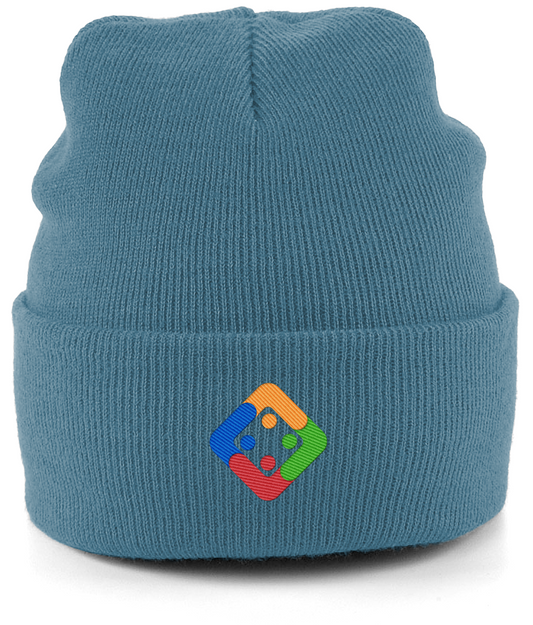The Rules of Uckers

No discussion in Uckers is more polarising than the one about which particular version of rules are to be played. However, to achieve our mission of bringing Uckers to the world, we have to settle on one version. The Uckers.com app allows for different variations on these rules to be played amongst friends but all games are based on the standard rules below. These rules are adapted from the Regional Physical Development Manual, 7A-1 July 2017, Version1 BRd 51 Vol 1.
The Rules
1. The game is played on a standard ludo board with stackable playing pieces with two dice.
2. Games can consist of 2 pairs (4 players) or two single players. In the pair’s version, the two partners must sit opposite to each other at the playing board.
3. Start: All four players in turn to throw both dice and the one with the highest score has first throw.
4. To get out of base: One six is required to get a piece out on the doorstep. The score on the other dice can be used to advance this or another piece in accordance with Rule 5. A double six can be used to put two pieces out of the onto the doorstep. Snake Eyes If on the very first throw a player (or pair) makes (and only the first throw) two ones are thrown then all player’s and partner’s pieces come out of the base onto the doorstep – this is known as all bits out.
5. Movement:
a. Pieces move in a clockwise direction, the number of squares equivalent to the value on the dice. The object is to get all one’s own and partner’s pieces around to their centre home before the opponents do likewise.
b. If a player has only one piece on the board, they must move it to the full value of both dice; intermediate squares cannot be used to knock off opponents' pieces. Rule 5d however, may allow this.
c. If a player has two pieces on the board, they may use the value of one dice for each, or the value of both dice for one.
d. If a player’s movements are blocked by a barrier (Rule 8a) or because a piece is near home (Rule 10b), they are to take the highest value of one dice if possible, or if not possible to move with either die, they do not move. They can, however, have extra throws in accordance with Rule 6.
6. Extra Throws: A player receives one extra throw for a six, except as in Rule 8c, when removing a barrier (blob), and only one extra is allowed for a double six.
7. Knocking off an Opponent’s Piece: When a player’s piece lands on the same square as an opponent’s piece, the opponent’s piece is returned to base and must start again.
8. Barriers (or ‘Blobs’):
a. When a player has two or more pieces on the same square, they form a barrier that blocks an opponent’s movements but not their partner’s.
b. To remove a barrier, an opponent must land a piece on the square immediately behind it, throw one six and say ‘Challenge’, throw a second and third six to remove a double barrier, a fourth six to remove a triple barrier and a fifth six to remove a quadruple barrier. The challenging piece occupies that square formerly occupied by the barrier and the barrier pieces are returned to their base in accordance with Rule 7. (See Rule 9). If the challenge is made by a blob and is successful, only one piece from the blob is moved one space onto the square formerly occupied by the challenged blob.
c. Having challenged a barrier, the value of any dice subsequently thrown cannot be used to advance any other piece and having successfully challenged a barrier the player’s turn is ended no matter how many sixes have been thrown. When a six is used to indicate a challenge the second dice, even if a six, cannot be used in any way. If the second or subsequent throw is a double six, both sixes count towards the removal of the barrier.
d. A player cannot move into a position and challenge in the same throw.
e. To knock-off a barrier on the doorstep with a piece in base requires one extra six in addition to those in 8b. The first six counts as the challenge and Rule 8c applies.
e. If a player cannot move another piece, they must break their barrier.
9. Mixed Barrier (or ‘Mixi Blobs’): If a player’s piece lands on the same square as one or more of their partner’s pieces, the result is what is known as a ‘mixed barrier’ (‘mixi blob’). This loses any value as a block and all pieces are able to be knocked-off in the same way as a single piece (Rule 7). A player cannot challenge from a mixed barrier behind an opponent’s barrier.
10. Getting Home:
a. A piece in the home-coloured lane cannot be reached by an opponent’s piece and is safe.
b. A player must throw the exact score to get a piece home, except that with their last piece they may get the exact score in one dice only. (See Rule 5d).
11. Throwing for One’s Partner: A piece in the home-coloured lane cannot be reached by an opponent’s piece and is safe. Having got all their pieces home a player waits for their next turn and tries to throw a six. Having thrown a six, a player again waits for their next turn when they can throw to help their partner’s pieces.
12. Winning Team: The winner(s) is the individual or pair who gets all their eight pieces home first.
Advanced Rules
WAFU (or Big Ship) Rules
Experienced players should always adopt ‘Big Ship’ or WAFU rules. This is the main rule addition which exists in the game of Uckers. It is the addition of Suck-Back and Blow-Back moves. These moves only become relevant when players have counters in their home channel.
1. Suck-Back – knocking-off an opponent’s counter (or blob) from their home channel.
a. To remove an opponent’s counter or blob already in their home channel, a counter must first be positioned on the square at the foot of the channel.
b. As with normal challenges, a counter cannot be moved into position and begin a Suck-Back on the same turn.
c. Once a counter is positioned, a player can elect to attempt Suck-Back
BEFORE throwing the dice by announcing “Suck-Back on ‘x’” where ‘x’ is the number of squares your opponents counter is up the channel (counting from the challenging counter).
d. To succeed a player must then throw that number on either dice or in total.
e. Whatever the Suck-Back throw achieves, the challenging player moves one square round the board and their turn is over.
f. If two counters in the channel are in a blob, then both counters must be removed at the same time with the correct double thrown.
g. Suck-Back cannot be attempted on a three-counter blob.
h. A player cannot reach over a blob in the channel to Suck-Back a single counter closer to home. However, a single counter can be Sucked-Back if it is closer than the blob.
i. If the player who is attempting the Suck-Back has a blob on the foot of the channel, then only one counter moves on one square, not both, thus splitting the blob and providing a second chance at a Suck-Back.
j. Mixie-blobs cannot suck back.
k. If a player throws a six during a Suck-Back attempt, it cannot be used elsewhere in the game and does not denote another turn.
l. A player cannot use the non-contributing dice to move another counter on the board.
Blow-Back – (the opposite to Suck-Back).
a. The player with a counter in the channel announces “Blow-Back” and the requisite number of squares back to the base square of the channel and the opponent’s counter
b. If successful with either die or the total of both dice the opponent’s counter is sent back to base and the challenger’s counter is moved to replace it at the base of the channel.
c. If a player fails to Blow-Back, they remain on the same square.
d. As with Suck-Backs, if there is a two counter blob at the base of the channel, a player must throw a double of the requisite number to succeed.
e. Blow-Backs cannot be attempted on a 3- or 4- counter blob.
f. A player can Blow-Back a mixie-blob, as it only counts as a single counter.
g. If a player throws a six, it cannot be used elsewhere in the game and does not denote another turn.
h. A player cannot use the non-contributing die to move another counter on the board.
Want to learn more?
We've put together some tutorials for you to learn about both the great game and also how to navigate the game on Android and iOS.
Some of our favourites
-
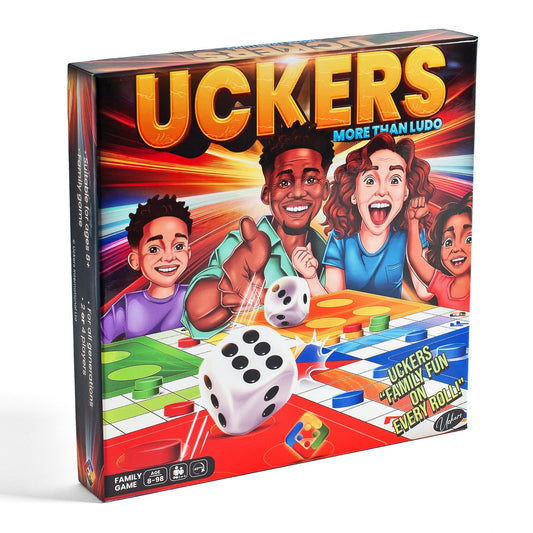
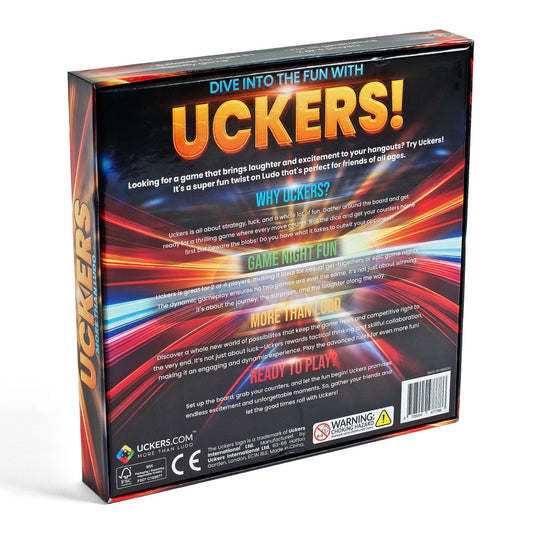 Sold out
Sold outUckers Family Board Game
Regular price £18.95 GBPRegular priceUnit price / per -
Beechfield Vintage Low Profile Cap with embroidered Uckers logo
Regular price £24.95 GBPRegular priceUnit price / per -
Cuffed Beanie with Uckers logo
Regular price £22.95 GBPRegular priceUnit price / per
Subscribe to our emails
Be the first to know about new collections and exclusive offers in the shop.
From the blog...
View all-
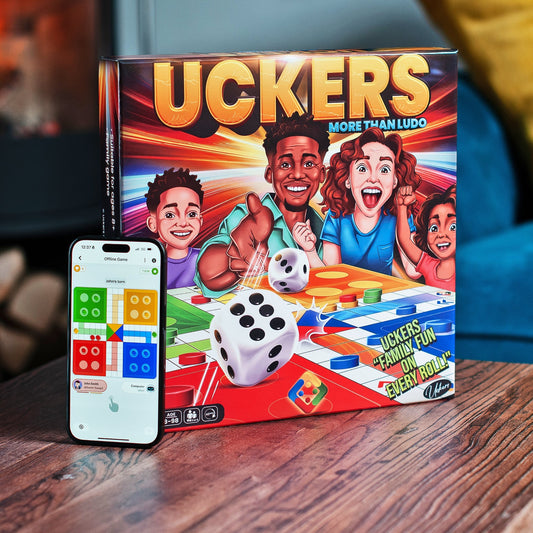
Uckers - The New Debate: Board vs. App
Uckers, a game of skill, chance, and a whole lot of fun, has been captivating players for decades. But with the rise of technology, a new question has emerged: Is...
Uckers - The New Debate: Board vs. App
Uckers, a game of skill, chance, and a whole lot of fun, has been captivating players for decades. But with the rise of technology, a new question has emerged: Is...
-
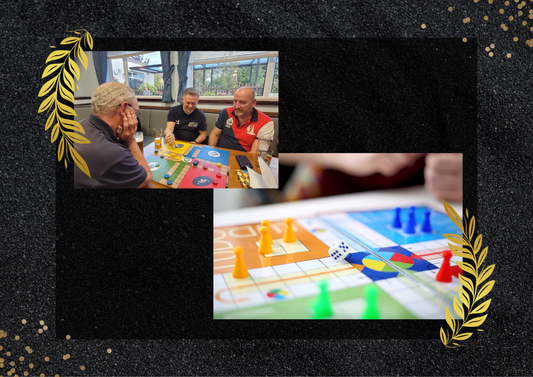
What are the differences between Uckers and Ludo?
The naval strategy game of Uckers has its roots in the family game of Ludo. This article explains the significant differences between the two and calls out why this Uckers as...
What are the differences between Uckers and Ludo?
The naval strategy game of Uckers has its roots in the family game of Ludo. This article explains the significant differences between the two and calls out why this Uckers as...
-

Are you an up-boarder? Why quitting is bad form.
The Importance of finishing your Uckers game We call out the reasons why quitting a game of Uckers in the app (and on a board) is just not cricket! ...
Are you an up-boarder? Why quitting is bad form.
The Importance of finishing your Uckers game We call out the reasons why quitting a game of Uckers in the app (and on a board) is just not cricket! ...






